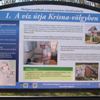 This is the first stop of Krishna Valley’s learning path on ecological farming.
This is the first stop of Krishna Valley’s learning path on ecological farming.
This approximately 2 km long walk shows how people can produce their basic needs in harmony with nature.
From the point of drinking water Krishna Valley is completely self-sufficient. The tube-well, which is deeper than 300 meters, provides fresh water for the community through pipelines. Previously, water of ground-wells was unfit to drink (because of high nitrate content) due to intense agricultural activity in the area. However, thanks to organic gardening during the last 15 years this water has been purified; therefore, water found in wells next to houses is in most cases drinkable.
As there is no electricity in the community, lack of washing machines means washing clothes by hand. In these water saving households, the consumption (50 liters/capita/day) is approximately half of the average Hungarian household (100-110 liters/capita/day).
The community tries to save water when gardening, too. We gather rainwater, which is used in organic plant conservation after soaking herbs in them. Additionally, we use the most effective way of irrigation, which is a drip tube system.
Wastewater feeds to the reed bed sewage system by natural gravitation. This is a system that follows the way of nature, as vegetation plays a vital part next to waters as well, in this case through the filtering and purifying activity of microorganisms. The septic tank is a closed system. While the wastewater slowly flows through the reed bed, it becomes purified both chemically and biologically. We use such cleansed water to irrigate a plantation of poplar trees.
Did you know…?
- that reed-bed sewage systems – if officially authorized – may be used in family households as well?
- that we have to take into account 4 square meters of reed bed per person in order to get an effectively cleansed wastewater?
